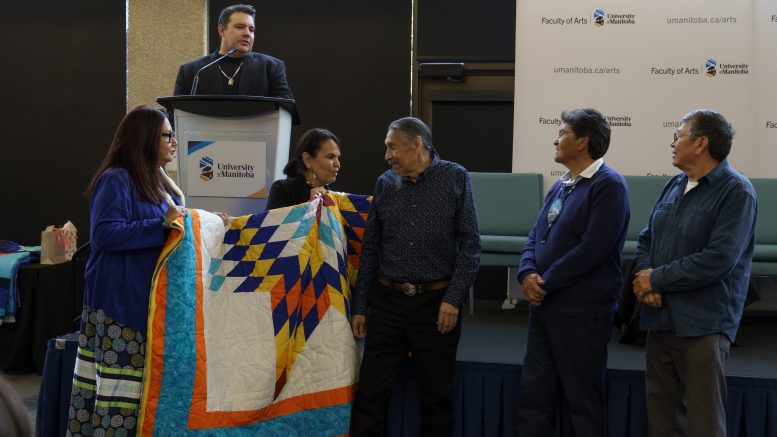The U of M’s department of Indigenous studies celebrated its 50th anniversary on Oct. 15 at Marshall McLuhan Hall. The event brought together faculty, alumni and students to honour five decades of Indigenous excellence, academic impact and community-building.
The gathering was an opportunity to both reflect on the past and reconnect with those who helped shape the department’s journey over the years. Founding members of the Indian, Métis, and Eskimo Student Association (IMESA), formed in 1971, were among the honoured guests.
Edwin Jebb, one of the original members of IMESA, shared that the formation of the association came during a time of strong social movements on campus. He said Indigenous students at the U of M faced racism on campus and believed that education was one of the best ways to challenge it. “We wanted to push for an Indigenous studies program. That way, we would educate the world and educate other students so they would have a better understanding of our people,” Jebb said.
Muriel Houle, an alumna of the Indigenous studies program, expressed her hopes for the department’s future. “I hope to see something new. As I was coming to U of M, I was very excited to take [a course on] my own language, and I know that was a recent development through a lot of hard work,” she said. “I love this community, and I really hope I can continue to be part of this community going forward.”
Encouraging new students to participate, Houle added, “Join the community, join the clubs, [there are] lots of opportunities […] I was [in] lots of clubs last year and it helped [me] build a family on campus.”
David Parent, an assistant professor of Indigenous studies and history, spoke about the importance of community engagement for Indigenous students. He said, “I would encourage you to get involved […] in your communities, in your nations, and always give back.” He also cautioned about the risks of disengagement, noting that it leaves the responsibility to individuals who do not have the lived experiences of Indigenous people, which can lead to “problematic frameworks.”
Lydia Gork, a Métis PhD student, said the department’s interdisciplinary approach was key to her academic path. “I found that the department of Indigenous studies was the perfect fit for my research because of its interdisciplinary nature and the way that it privileges Indigenous knowledges.” Gork noted that her studies allowed her to “bring my family’s Métis knowledge into the academy […] to help challenge existing histories that have dehumanized Métis people.”
Niigaanwewidam Sinclair, a professor of Indigenous studies, former head of the Indigenous studies department and a current columnist for the Winnipeg Free Press, surveyed the immense impact of the department’s alumni. “[At the department] you have seen people who have changed lives, published the most groundbreaking books, you have seen people who have done incredible contributions to Indigenous communities at the grassroots level,” he said. “Many of our students go on to become chiefs, or counsellors, or doctors or lawyers,” he added, citing the Grand Chief of Manitoba as a former student.
For Sinclair, this evidence demonstrates “that Indigenous studies is not only a critical part of this university, but it’s really a critical part of the province.” The department’s work, he explained, has formed a critical foundation. “It has formed the basis for so [many] of the relationships we now know between Indigenous peoples and Canadians.”
Sinclair concluded by defining the department’s enduring legacy. “The legacy of Indigenous studies is really about building the country but also building the sovereignty […] of our First Nations, Inuit and Métis communities.”
The event also honoured Emma LaRocque, Indigenous studies professor and author of the influential 1975 book Defeathering the Indian, for her contributions to the department. Sinclair was also honoured for his 2024 publication, Wînipêk.
Indigenous student enrolment at the U of M grew by 10.7 per cent this term, increasing from 2,933 students in fall 2024 to 3,248 in fall 2025. This growth highlights the university’s continued dedication to reconciliation and Indigenous excellence, and reflects the confidence Indigenous students place in the U of M as a meaningful part of their academic path.
Watch a brief coverage of the event here: https://www.youtube.com/watch?v=sFCaJPtGORY&t=8s

